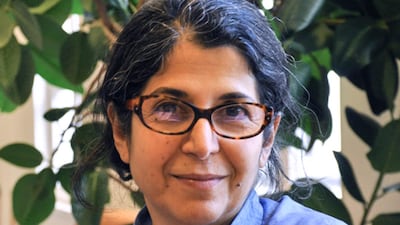French-Iranian academic Fariba Adelkhah on Wednesday ended a six-week hunger strike in a prison in Iran as she awaits trial on charges including conspiring against national security, her lawyer said.
"Adelkhah responded to a written request from civil and political activists and ended her hunger strike at midday today," lawyer Said Dehghan told AFP.
Mr Dehghan expressed relief that Ms Adelkhah had ended the hunger strike that she began on December 24, but said she remained fragile.
"Her mental and physical condition is not good, she has been weakened," he said. "Her voice was difficult to hear and she has difficulty walking."
Ms Adelkhah, a specialist in Shiite Islam and a research director at Sciences Po University in Paris, was arrested in June and is being held in the notorious Evin prison in Tehran. Her French colleague Roland Marchal was detained at the same time while visiting her, according to Mr Dehghan, who represents both academics.
A Paris-based group that has organised gatherings in the French capital in support of the pair welcomed her decision to end the hunger strike.
"This is a great relief because we were increasingly concerned about her health," the support committee said in a statement.
"But obviously, mobilisations are more necessary than ever to get Fariba and Roland out of Evin and we are trying our best to widen our actions," it added.
According to the committee, Ms Adelkhah had stopped taking food to demand the release of Mr Marchal amid concerns about his health.
Iran has dropped espionage charges against Ms Adelkhah but she is still accused of spreading "propaganda against the political system" and "conspiracy against national security".
Mr Marchal is accused of "collusion against national security", according to the lawyer.
The detention of the two academics has raised tensions between Iran and France, which has called for them to be released as a "gesture" of goodwill.
Iran, which does not recognise dual nationality, has repeatedly criticised France for what it calls its "interference" in Ms Adelkhah's case.
The two researchers are not the only foreign academics behind bars in Iran.
Australian Kylie Moore-Gilbert of the University of Melbourne is serving a 10-year sentence after being found guilty of espionage.

